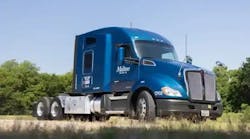Manager: Gary Simmons
Title: vp-fleet management
Fleet: Casella Waste Systems, Rutland, VT
Operation: Refuse collection and disposal
PROBLEM
It's no secret that the refuse business is tough on trucks — all the starting and stopping, plus high rpm at idle to run the hydraulics powering the garbage packer, puts a lot of strain on the engine — and the engine oil. For Casella Waste Systems, that working environment translates into frequent oil changes for its residential collection trucks, one about every 300 hours, or roughly seven to eight times a year for trucks racking up about 2,400 hours of operation annually. At nearly $100 an oil change, that adds up to some serious cash. Because of this, Gary Simmons, vp-fleet management, began investigating ways to extend oil changes without compromising the health of his trucks.
“The actual base stock oil never wears out; only the additives become depleted primarily due to contamination,” he says.
Simmons notes that for Casella's trucks, the volume of oil required to lubricate the engine is quite large, 30 to 55 quarts, which is why the typical factory full-flow filter is designed to filter out particles of only 10 micron and larger.
“That way, it won't restrict this large volume of oil needed to protect the bearings and all the other moving parts of the engine,” he explains. “However, as a result of this design the most damaging particles, 2 to 10 microns in size, are allowed to remain in suspension in the engine oil. This causes the contamination, which requires the oil to be replaced.”
For Casella, the goal was finding a way to remove those smallest contaminates.
SOLUTION
In December 2006, Simmons signed up with Oil Purification Systems, maker of the OPS-1 bypass oil filtration system, to run a ten-month test of its technology on several of Casella's trucks. Simmons says that by using the OPS-1 oil filter to complement the factory engine full-flow filters, and by changing the OPS-1 oil filter element on a regular basis, Casella should be assured of clean lubrication all the time, while diminishing additive depletion by eliminating the suspended contaminates in the oil.
“Additives are an intricate part of the oil and are blended in by the refiner; the OPS-1 system will not filter these additives out and does not affect oil additives or detergents in any way,” explains Simmons. “Since the oil is kept constantly clean, the additives have much less work to do.”
After reviewing the test data late last year, Simmons found the OPS-1 filtration system could significantly extend the time between oil changes, reducing oil, parts and maintenance costs by roughly $600 per year for each vehicle. With that data in hand, Casella moved quickly to install the technology in all 800 of its residential refuse trucks by March of this year.
Simmons stresses that adding extra filtration doesn't mean the fleet can backslide on sound engine oil practices. “We require oil samples to be taken every 42 days, or 300 hours,” he explains.
With each of the company's residential refuse trucks running more than 2,400 hours per year, and often in tough road and weather conditions, Simmons notes that Casella is quickly reaping benefits. “It's extending the life of our engines' oil, and saving the company a substantial amount of money in oil maintenance costs,” he says.
Maintenance Bay presents case studies detailing how fleets resolve maintenance-related issues.


